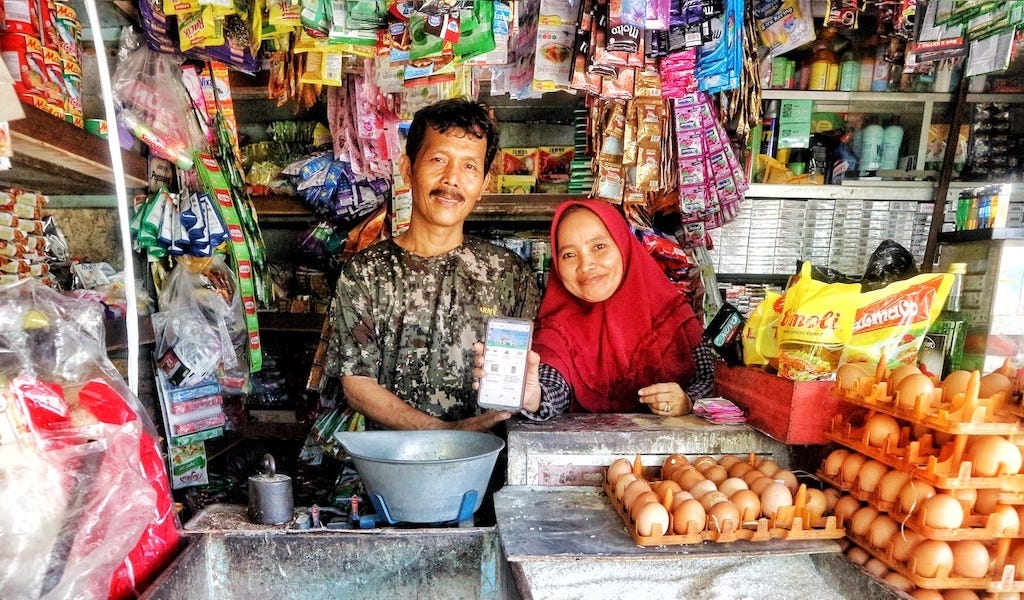Next Billion Dollar Opportunity: Revolutionizing Global Retail and Society In Unexpected Places
(How About from Kenya, Pakistan and Indonesia?)
Bring up terms like “B2B market places” or “supply chain management” in a zoom gathering, even among the nerdiest investors, and you can see people’s eyes palpably glaze over. So let me make them a bit more personal and tell you how innovation among them are changing our very global economic order quietly but rapidly bottom up.
Some years ago I visited Kenya where there are over 130,000 mom and pop stores in Nairobi alone, selling fruits and vegetables and consumer products the same way for a century. A store owner would wake at 4:00 AM and walk two hours to visit the one major whole-sale market, pay someone a small amount to cart inventory back for the day and that was that. The basic tools of transparent data, more efficient logistics, better inventory management, access to credit all to expand their businesses were at best a pipe dream.
And yet this is how over 90% of all retail products are sold across markets from Jakarta to Karachi to Cairo to Nairobi to Sao Paulo and beyond. Retail represents trillions of dollars across these markets and even in Covid, many will grow 8% in this past year. There is near universal access to technology in all of them, certainly increasingly affordable smart phones and data, and an ever younger demographic that simply expects something better.
I just moderated a webinar with three of the leading lights offering astounding solutions:
Grant Brooke co-founded Twiga Foods, one of fastest growing b2b markets places in Africa. Grant brought long expertise studying informal markets across the continent, and is now also the co-founder of Shara, developing free route-to-market software for consumer goods companies across all developing markets. Hamza Jawaid is the co-founder of Bazaar, one of the most exciting players based in Pakistan. He is a local from Karachi who went to LSE and McKinsey and brings extensive experience in understanding the unique dynamics of emerging markets. Nipun Mehra was trained in Stanford and Wharton and has had extensive experience at Amazon and FlipKart. He co-founded Ula to go after a greater than $800 bb retail market opportunity first in Indonesia and then across South East Asia.
The conversation was a mind blow and you can listen to it again here:
Four of many takeaways for me included:
1) The problems are shared and opportunity massive. Bringing efficiency, transparency and empowerment to retail environments of fragmented purchasing power and fragmented supply lines all in a fragmented supply ecosystem with little to no real data, information or access to credit is a multi-billion dollar opportunity in these markets alone.
2) The solutions are shared and are rising everywhere. World-class entrepreneurs are building similar, rapidly growing merchant-focused platforms of transparent data, purchasing decisions, and cheaper and more efficient logistics. They increase purchasing power and lower costs, allowing store owners to free up time for their internal operations and growth. These improvements aren’t on the margin, but can have ten-fold ramifications quickly.
3) The platforms are building enormous and unique data sets revolutionizing retailers’ internal efficiencies and offering new services. This gives never-before available insight into purchasing behaviors bottom up, offering greater insight into what is really going on in the local economy and unleashing further business opportunity. Data has allowed them to 1) better predict vendor behaviors and credit worthiness in order to offer reliable loans to millions unbanked or relying on high interest neighborhood solutions; 2) offer better insight in supply and demand so vendors can better predict inventory needs or when to offer promotions; 3) have greater insight into what suppliers are harvesting thus better predicting volume and potential shorts falls.
4) Trusted relationships on the ground are essential but technology enhances and scales this capability. Human touch and relationships remain paramount, but many vendors use WhatsApp and other technology in ways WhatsApp itself barely understands. They use these tools to help invoice and confirm orders. And they create networks and groups sharing insight and recommendations on what platforms are to be trusted. These vendors are progressively tech savvy, using YouTube, TikTok and Instagram for information and promotion. As devices and 3G and 4G access are becoming near universal, and ever more affordable, this will only increase.
A new firm I co-founded and advise, Next Billion Ventures, is committed to investing in and joining the journey to help great entrepreneurs across rising markets - we focus on South East Asia, Latin America, MENA and beginning in Pakistan and Africa.
For all that obviously differs among these markets in geography, culture, language and more, we believe that these amazing women and men starting enterprises often share astounding on-the-ground challenges and opportunities — regularly more often with each other than with Silicon Valley. In fact, as Grant said in this webinar, “We don’t learn a lot from Silicon Valley… rather from what people are doing in markets that look like ours.”
The pattern recognition we have formed in speaking to hundreds of founders help us assess where lesser known opportunity lie, but more importantly, make us a better and more insightful friend to the entrepreneurs themselves.
This webinar gives you a taste of the exciting experiences we get to see each day.





Hey Chris — my name is Chelsia Rose Marcius and I'm a journalist working for the New York Times. Sorry to bother you here. I just messaged you on FB about a story I'm working on, but figured you didn't see my note since we're not connected on FB. Wanted to reach out another way. Thanks very much.
Excellent analysis Chris. I have been following the growth of this industry for a while. Would love to connect with you